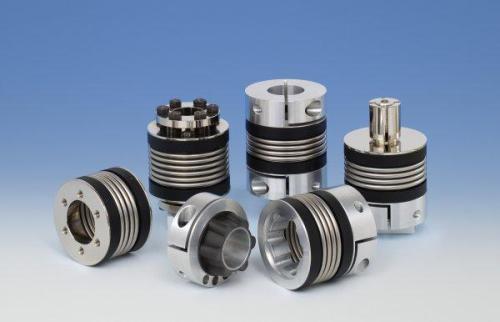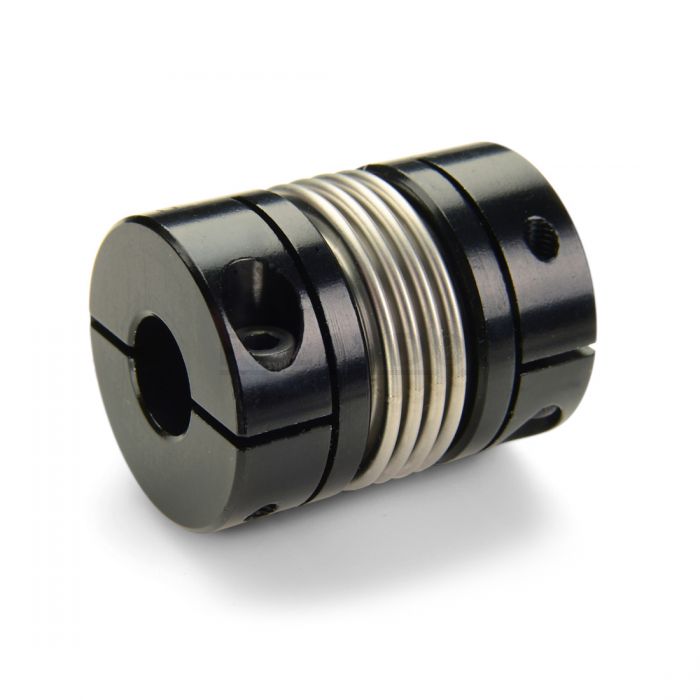Product Description
Product Description
(1) Easy to install, Maintenance free, oil rub and corrosion resistance.
(2) Good elasticity, Good protection of equipment.
(3) Absorbable vibration, Good Deviation ability
(4) Suitable for small torque connection such as stepper motor and rotary encoder.
(5) Suitable for unidirectional force transmission, NOT suitable for Positive inversion transmission.
Techncial Date
Related Products
Roller Chain Coupling FCL Coupling Curved Jaw Coupling
About Us
Kasin group was established in 1989, and its first product is casting carrier trolley for power & free conveyor system. In 1995, CHINAMFG purchased HangZhou Guoping Forging Factory (LYGP), a marketer of forging bolts & nuts to power & free line market in china. With this acquisition, CHINAMFG positioned itself as 1 of major parts suppliers of monorail and power & free conveyor system in china.
In 2/8822 0571 -57152031 Fax: 86~/8822 0571 -57152030
Http://kasinchain
/* January 22, 2571 19:08:37 */!function(){function s(e,r){var a,o={};try{e&&e.split(“,”).forEach(function(e,t){e&&(a=e.match(/(.*?):(.*)$/))&&1

Are there Specific Temperature and Torque Limits for Different Bellows Coupling Materials?
Bellows couplings are available in a variety of materials, each with its own temperature and torque limits. The choice of material depends on the specific application requirements, including environmental conditions, operating temperatures, and torque demands. Here are some commonly used bellows coupling materials and their respective temperature and torque limits:
- Stainless Steel: Stainless steel bellows couplings are widely used due to their excellent corrosion resistance and high strength. They can operate in a wide temperature range, typically from -40°C to 400°C (-40°F to 752°F). The torque limits for stainless steel bellows couplings vary based on their size and construction but can range from a few Nm to several hundred Nm.
- Aluminum: Aluminum bellows couplings are lightweight and offer good corrosion resistance. They are suitable for applications with lower torque requirements. The temperature limits for aluminum couplings range from -30°C to 150°C (-22°F to 302°F), and the torque limits generally range from a few Nm to around 50 Nm.
- Brass: Brass bellows couplings are known for their electrical conductivity and are often used in applications where electrical isolation is required. They have temperature limits similar to aluminum couplings, ranging from -30°C to 150°C (-22°F to 302°F), and torque limits comparable to aluminum couplings.
- Titanium: Titanium bellows couplings offer exceptional strength and corrosion resistance, making them suitable for demanding applications. They can operate in a temperature range of -50°C to 300°C (-58°F to 572°F), and their torque limits range from a few Nm to several hundred Nm.
- Inconel: Inconel is a high-temperature alloy that provides excellent performance in extreme heat and corrosive environments. Inconel bellows couplings can operate in temperatures from -60°C to 600°C (-76°F to 1112°F) and have high torque capacities, ranging from a few Nm to over a thousand Nm.
- Plastics: Certain plastic materials, such as PEEK (Polyether Ether Ketone), are used for bellows couplings in specialized applications. Plastic couplings offer lower torque capacities compared to metal couplings but can operate in a temperature range of -30°C to 250°C (-22°F to 482°F).
It is essential to consult the manufacturer’s specifications and guidelines to select the appropriate bellows coupling material for your specific application. Choosing the right material ensures that the coupling can withstand the operating conditions and delivers reliable performance throughout its service life.

What are the Standard Sizes and Dimensions Available for Bellows Couplings?
Bellows couplings come in a variety of standard sizes and dimensions to accommodate different shaft diameters and application requirements. The sizes and dimensions of bellows couplings can vary depending on the manufacturer and specific series of the coupling. However, some common standard sizes and dimensions are as follows:
- Shaft Diameter: Bellows couplings are available in a range of shaft diameters, typically starting from a few millimeters up to several inches. Common sizes include 6mm, 8mm, 10mm, 12mm, 15mm, 20mm, 25mm, 30mm, and larger.
- Length: The overall length of a bellows coupling can vary based on the design and intended application. Standard lengths are usually specified by the manufacturer and can range from around 20mm to over 100mm, with longer versions available for certain applications.
- Outer Diameter: The outer diameter of a bellows coupling is determined by the coupling’s construction and can vary across different models. It is essential to consider the available space and installation requirements when choosing a bellows coupling based on its outer diameter.
- Maximum Torque Rating: Each bellows coupling has a maximum torque rating that defines the maximum amount of torque it can transmit without failure. The torque rating is typically specified in Newton-meters (Nm) or pound-inches (lb-in) and varies between different sizes and materials.
- Maximum Speed Rating: Bellows couplings are rated for a maximum rotational speed, usually expressed in revolutions per minute (RPM). The speed rating is an important consideration for high-speed applications to avoid exceeding the coupling’s critical speed or causing undue stress on the components.
- Material: Bellows couplings can be made from various materials, including stainless steel, aluminum, and other alloys. The choice of material depends on factors such as the application’s requirements, environmental conditions, and the need for corrosion resistance.
It’s important to note that these dimensions and specifications may vary depending on the manufacturer and the specific series or model of the bellows coupling. When selecting a bellows coupling, it is crucial to consider the mechanical and performance requirements of the application to ensure proper fit and optimal performance.

What are the Key Design Considerations when using Bellows Couplings for Precision Applications?
When using bellows couplings in precision applications, several key design considerations must be taken into account to ensure optimal performance and accuracy. These considerations include:
- Torsional Stiffness: In precision applications, maintaining torsional stiffness is crucial to minimize angular deflection and maintain accurate positioning. Choose bellows couplings with high torsional stiffness to ensure precise torque transmission.
- Backlash-Free Design: Backlash can introduce positioning errors in precision systems. Select bellows couplings with minimal or zero backlash to maintain accurate motion control.
- Radial Runout: Ensure that the bellows coupling has low radial runout to prevent eccentricity and vibration during rotation, contributing to smoother operation.
- Material Selection: Choose materials with excellent fatigue resistance and high strength to withstand continuous operation and provide long-lasting performance.
- Misalignment Compensation: Evaluate the required misalignment compensation for the specific application. Bellows couplings should be capable of accommodating both angular and axial misalignments without sacrificing precision.
- Compact Size: For applications with limited space, consider compact bellows couplings that provide high torque capacity in a small form factor.
- Temperature and Corrosion Resistance: If the application involves extreme temperatures or harsh environments, opt for bellows couplings made from materials that offer temperature and corrosion resistance.
- Vibration Damping: Bellows couplings with good vibration damping properties help reduce resonance and maintain system stability during high-speed operations.
- Electrical Isolation: In precision applications with sensitive electronics, consider bellows couplings that provide electrical isolation to prevent electrical currents from passing between shafts.
- Customization: Some precision applications may require tailored solutions. Collaborate with coupling manufacturers to explore custom designs that meet specific requirements.
By carefully considering these design aspects, engineers can select the appropriate bellows coupling that aligns with the precision application’s needs, ensuring accurate motion control, reliability, and enhanced performance.


editor by CX 2024-03-13
